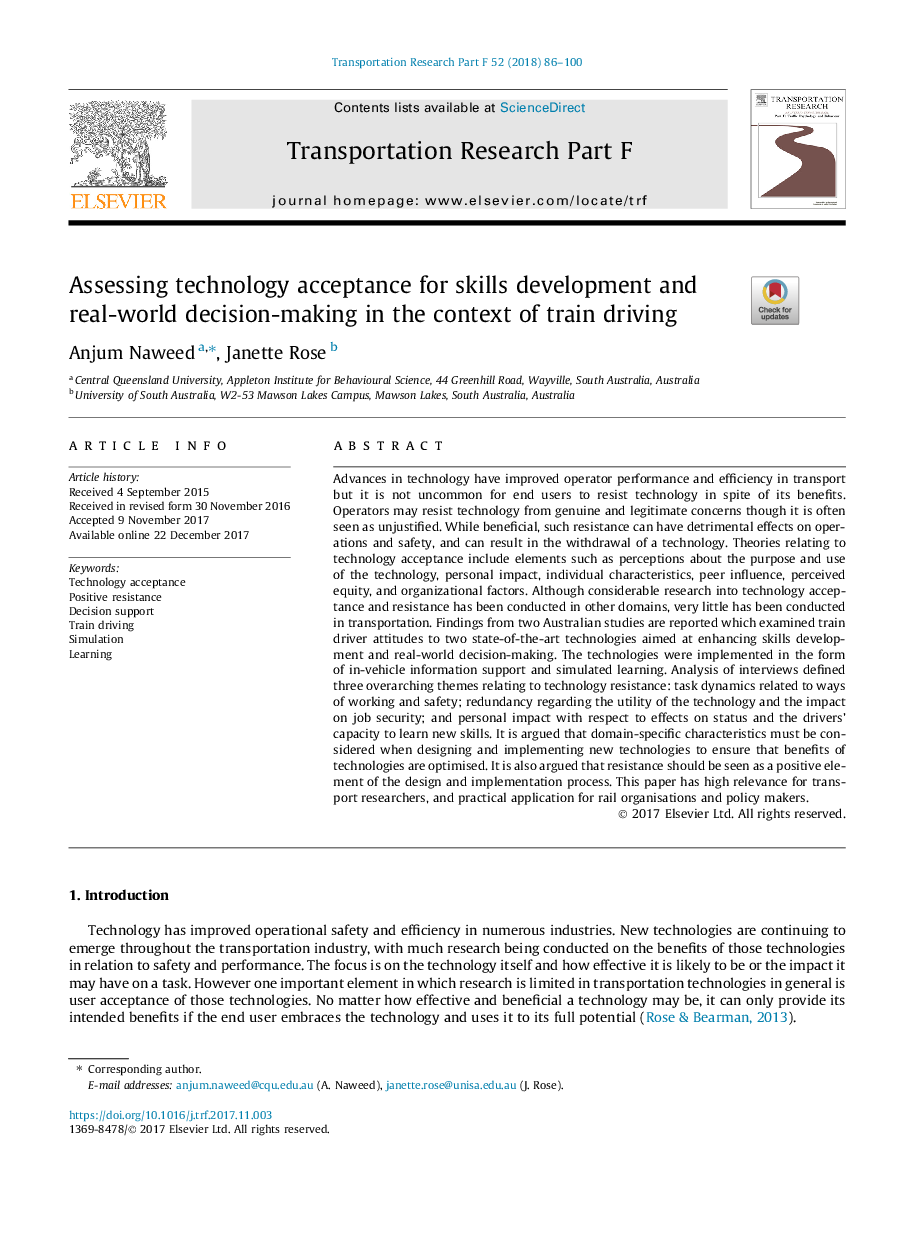| کد مقاله | کد نشریه | سال انتشار | مقاله انگلیسی | نسخه تمام متن |
|---|---|---|---|---|
| 7258056 | 1472434 | 2018 | 15 صفحه PDF | دانلود رایگان |
عنوان انگلیسی مقاله ISI
Assessing technology acceptance for skills development and real-world decision-making in the context of train driving
ترجمه فارسی عنوان
ارزیابی پذیرش فناوری برای توسعه مهارت ها و تصمیم گیری در دنیای واقعی در زمینه رانندگی قطار
دانلود مقاله + سفارش ترجمه
دانلود مقاله ISI انگلیسی
رایگان برای ایرانیان
کلمات کلیدی
پذیرش فناوری، مقاومت مثبت، پشتیبانی تصمیم رانندگی قطار، شبیه سازی، یادگیری،
ترجمه چکیده
پیشرفت های تکنولوژی باعث بهبود عملکرد اپراتور و بهره وری در حمل و نقل شده است، اما برای مصرف کنندگان نهایی، به رغم مزایای آن، مقاومت در برابر تکنولوژی، غیر معمول نیست. اپراتورها ممکن است از تکنولوژی در برابر نگرانی های واقعی و قانونی مقاومت کنند، هرچند که اغلب به عنوان غیرقابل قبول دیده می شود. در حالی که مفید است، چنین مقاومت می تواند اثرات مضر روی عملیات و ایمنی داشته باشد و می تواند منجر به برداشتن تکنولوژی شود. نظریه های مربوط به پذیرش تکنولوژی شامل عناصری نظیر درک در مورد هدف و استفاده از فناوری، تاثیر شخصی، ویژگی های فردی، نفوذ همسالان، عدالت درک شده و عوامل سازمانی است. اگر چه تحقیقات قابل توجه در پذیرش و مقاومت فناوری در زمینه های دیگر انجام شده است، در حمل و نقل بسیار کم است. یافته های دو مطالعه استرالیا گزارش شده است که نگرش های راننده ی قطار را به دو تکنولوژی پیشرفته تر با هدف ارتقاء توسعه مهارت ها و تصمیم گیری در دنیای واقعی بررسی می کند. این فن آوری ها به صورت پشتیبانی اطلاعات خودرو و یادگیری شبیه سازی شده اجرا شد. تجزیه و تحلیل مصاحبه ها سه مضمون کلیدی مرتبط با مقاومت فناوری را تعریف کرد: دینامیک کار با روش های کار و ایمنی؛ افزونگی در مورد کاربرد فناوری و تأثیر آن بر امنیت شغلی؛ و تاثیر شخصی در رابطه با تأثیرات روی وضعیت و توانایی رانندگان برای یادگیری مهارت های جدید. استدلال می شود که هنگام طراحی و پیاده سازی فن آوری های جدید برای اطمینان از بهینه سازی مزایای فن آوری ها باید ویژگی های خاص دامنه را در نظر گرفت. همچنین استدلال می شود که مقاومت باید یک عنصر مثبت از روند طراحی و پیاده سازی باشد. این مقاله برای پژوهشگران حمل و نقل بسیار مهم است و کاربرد عملی برای سازمان های راه آهن و سیاست گذاران.
موضوعات مرتبط
علوم انسانی و اجتماعی
روانشناسی
روان شناسی کاربردی
چکیده انگلیسی
Advances in technology have improved operator performance and efficiency in transport but it is not uncommon for end users to resist technology in spite of its benefits. Operators may resist technology from genuine and legitimate concerns though it is often seen as unjustified. While beneficial, such resistance can have detrimental effects on operations and safety, and can result in the withdrawal of a technology. Theories relating to technology acceptance include elements such as perceptions about the purpose and use of the technology, personal impact, individual characteristics, peer influence, perceived equity, and organizational factors. Although considerable research into technology acceptance and resistance has been conducted in other domains, very little has been conducted in transportation. Findings from two Australian studies are reported which examined train driver attitudes to two state-of-the-art technologies aimed at enhancing skills development and real-world decision-making. The technologies were implemented in the form of in-vehicle information support and simulated learning. Analysis of interviews defined three overarching themes relating to technology resistance: task dynamics related to ways of working and safety; redundancy regarding the utility of the technology and the impact on job security; and personal impact with respect to effects on status and the drivers' capacity to learn new skills. It is argued that domain-specific characteristics must be considered when designing and implementing new technologies to ensure that benefits of technologies are optimised. It is also argued that resistance should be seen as a positive element of the design and implementation process. This paper has high relevance for transport researchers, and practical application for rail organisations and policy makers.
ناشر
Database: Elsevier - ScienceDirect (ساینس دایرکت)
Journal: Transportation Research Part F: Traffic Psychology and Behaviour - Volume 52, January 2018, Pages 86-100
Journal: Transportation Research Part F: Traffic Psychology and Behaviour - Volume 52, January 2018, Pages 86-100
نویسندگان
Anjum Naweed, Janette Rose,
